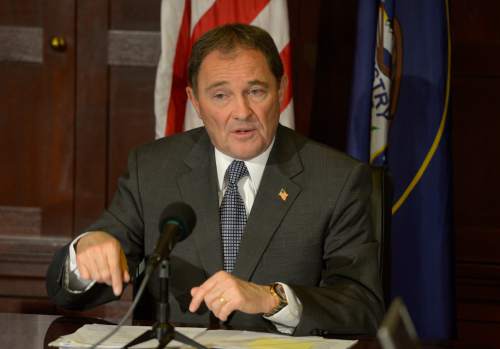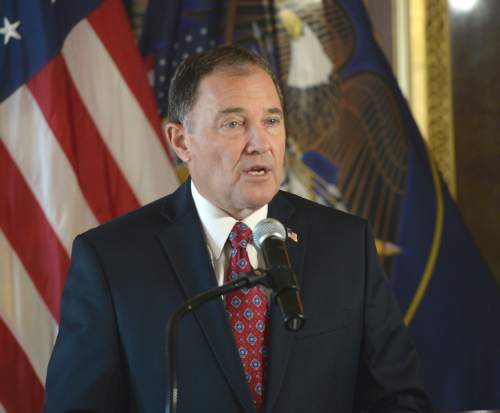This is an archived article that was published on sltrib.com in 2014, and information in the article may be outdated. It is provided only for personal research purposes and may not be reprinted.
Gov. Gary Herbert believes the election reforms passed last legislative session taking away considerable candidate-nominating power from political parties are constitutional, seemingly backing away from a spokesman's assertion Saturday that there was doubt whether the law was constitutional.
At the heart of the issue is a lawsuit filed last week by the Utah Republican Party, challenging SB54, a law passed last session letting potential candidates circumvent the party's nominating convention and still make it to the primary ballot and have a shot at winning the party's nomination.
The GOP contends that it is unconstitutional for the state to take away the party's right to choose who it wants as its candidate.
And on Saturday, Derek Miller, Herbert's former chief of staff and political adviser, drew rousing applause from the GOP State Central Committee when he was sent by Herbert to declare the governor's apparent support for the lawsuit — which names Herbert as a defendant.
"The governor believes that there is a legitimate, legal and constitutional question on the lawsuit, and it is appropriate for it to move forward to once and for all resolve that," Miller said.
The party sent a Tribune news article about the comments to everyone on its email list — numerous times, it turned out, due to a computer glitch.
But on Monday, Herbert's spokesman Marty Carpenter tempered those remarks.
Herbert supports the existing nominating system — where delegates chosen at neighborhood caucuses gather to pick nominees at the party conventions — and believes he wouldn't be governor if that system weren't in place. But, Carpenter said, the governor supports the changes in SB54.
"The governor believes S.B. 54 to be constitutional and signed the bill because it is a good compromise that preserves the caucus and convention system while providing more opportunities for participation by the general electorate," Carpenter said in a statement.
—
'Where the governor's heart is' • Utah Republican Party Chairman James Evans said he and the party "accept both statements" from Herbert.
"We know where the governor's heart is," Evans said. "But we recognize that he's still the governor of the entire state."
The Legislature adopted SB54 as a compromise with leaders of the Count My Vote organization, which had spent more than $1 million and gathered more than 100,000 signatures to put a measure on the 2014 ballot to change Utah's nominating system.
The compromise allows parties to still choose nominees at convention, but also lets candidates gather a requisite number of signatures to get on the primary ballot, without going through the convention process.
As it turns out, both Herbert — the defendant in the Utah GOP's lawsuit — and Attorney General Sean Reyes, who will have to defend it, contributed to some degree to suing themselves.
Reyes has given the Utah Republican Party about $30,000 in recent years. Herbert has donated about $75,000 to the party since 2010.
Evans said Count My Vote supporters have actively discouraged traditional Republican donors from giving money to the party, warning that such contributions would be used to combat the Count My Vote effort.
The party has had to cut operating costs, he said, and has gone out and found other donors to make up the difference.
"As an organization, we cannot be held financially hostage to anyone's agenda," Evans said.
Count My Vote donors include a list of prominent Republicans, among them former presidential nominee Mitt Romney, U.S. Sen. Orrin Hatch, former Gov. Mike Leavitt and prominent Utah businesswoman Gail Miller.
—
Chilling donors? • But a Tribune analysis of the financial disclosures filed by the state party and Count My Vote shows that almost none of the Count My Vote donors had given money to the GOP since at least 2008.
Only one Count My Vote Donor — Merit Medical Corp. — had curtailed its contributions to the Utah Republican Party since the Count My Vote effort ramped up. Between 2008 and 2012, Merit and its CEO, Fred Lampropoulos, had given more than $153,000 to the GOP. In 2014, Merit gave just $3,500 to the party. It gave $25,000 to help Count My Vote in 2013.
Lampropoulos did not return a phone call inquiring about the change in donations.
In a scathing email to the Salt Lake County Republican Party last week, political consultant and lobbyist LaVarr Webb scolded the party for asking him for money while supporting the fight against Count My Vote and vowed not to give any money to the county or state party while the lawsuit is going on.
However, records show Webb had not given to the state GOP since at least 2008.
Evans said he has been told by lobbyists that their business clients have been cautioned against giving to the party while the lawsuit is underway.
"The whole narrative is out there that if you give to the party you're giving against our interests," Evans said.
Rich McKeown, co-chairman of Count My Vote, said organizers haven't discouraged support of the party.
"That's not an active effort to try and do this," he said. "But I think it is a divisive issue between the people who are trying very hard to defend the system that has historical roots versus those who have agreed to try a new system."
McKeown actually gave $1,000 to the Utah GOP in October 2013, as Count My Vote was gathering signatures for its initiative petition. He gave $25,000 to Count My Vote.
Evans has apparently cited Count My Vote's alleged efforts to chill party donations in his contribution solicitations. Rep. Dan McCay, who sponsored SB54, said he gave $1,000 to the party — explicitly for operations — after Evans told him Count My Vote organizers had shut down other donors.
Twitter: @RobertGehrke





